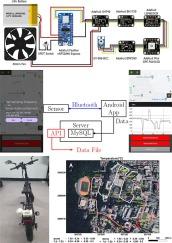利用安卓平台的低成本城市热环境传感设备,实现数字孪生
IF 2.1
Q3 ENGINEERING, ELECTRICAL & ELECTRONIC
引用次数: 0
摘要
对热量和气象变量进行适当监测,对大都市地区居民的福祉至关重要。在复杂的城市环境中配置空间热量变化具有挑战性,尽管城市热通量的时间变化已在几个指定的监测站进行了测量。用于有效监测城市热量的预算和现有技术都不足以实现城市热环境的数字孪生。因此,我们开发了一种低成本的监测系统,可以轻松集成到便携式行人设备、脚踏板或电动自行车中。通过该系统,市民可以收集有关城市热量的信息,如空气温度、地表温度、相对湿度、气压、光照强度以及微观地球物理特征,包括地形方面和移动信息(如三维加速度)。市民可以使用这些设备参与日常科学活动,从而促进城市数字孪生环境中的数据采集和信息交换。本文章由计算机程序翻译,如有差异,请以英文原文为准。

Low-cost urban heat environment sensing device with Android platform for digital twin
The proper monitoring of heat and meteorological variables is essential for the well-being of residents of metropolitan areas. It is challenging to configure spatial heat variations in complex urban environments, even though the temporal variation of urban heat flux has been measured at several designated monitoring stations. Neither the budget nor existing techniques for efficient urban heat monitoring are sufficient for a digital twin of the urban heat environment. As a result, we have developed a low-cost monitoring system that can be easily integrated into a portable pedestrian device, kickboard, or electric bike. With this system, citizens can collect information about urban heat, such as air temperature, surface temperature, relative humidity, barometric pressure, light intensity, and micro-geophysical features including topological aspects and mobile information (e.g., three-dimensional accelerations). Citizens can participate in daily scientific activities using these devices, which facilitate data acquisition and information exchange in urban digital twin environments.
求助全文
通过发布文献求助,成功后即可免费获取论文全文。
去求助
来源期刊

HardwareX
Engineering-Industrial and Manufacturing Engineering
CiteScore
4.10
自引率
18.20%
发文量
124
审稿时长
24 weeks
期刊介绍:
HardwareX is an open access journal established to promote free and open source designing, building and customizing of scientific infrastructure (hardware). HardwareX aims to recognize researchers for the time and effort in developing scientific infrastructure while providing end-users with sufficient information to replicate and validate the advances presented. HardwareX is open to input from all scientific, technological and medical disciplines. Scientific infrastructure will be interpreted in the broadest sense. Including hardware modifications to existing infrastructure, sensors and tools that perform measurements and other functions outside of the traditional lab setting (such as wearables, air/water quality sensors, and low cost alternatives to existing tools), and the creation of wholly new tools for either standard or novel laboratory tasks. Authors are encouraged to submit hardware developments that address all aspects of science, not only the final measurement, for example, enhancements in sample preparation and handling, user safety, and quality control. The use of distributed digital manufacturing strategies (e.g. 3-D printing) is encouraged. All designs must be submitted under an open hardware license.
 求助内容:
求助内容: 应助结果提醒方式:
应助结果提醒方式:


